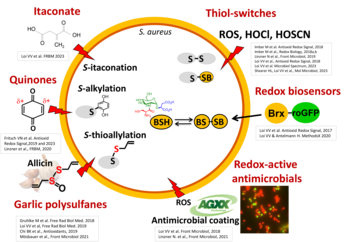Department of Biology, Chemistry, Pharmacy
Service Navigation
Microbiology
The microbiology groups of Prof. Haike Antelmann and Prof. Mitja Remus-Emsermann focus their research on the molecular mechanisms of host-pathogen interactions, bacterial adaptation towards stress and antimicrobials, phage defense mechanisms (Antelmann) and the microbial communities on plant surfaces (Remus-Emsermann). The research of the Antelmann group involves important model bacterial pathogens, such as Staphylococcus aureus and enteropathogenic Escherichia coli. The research of the Remus-Emsermann group focusses on defined “synthetic” microbial communities, colonizing plant surfaces and tissues of model plants, such as Arabidopsis thaliana.
Regular interactions of the microbiology groups are with groups focusing on plant sciences, structural biochemistry and veterinary medicine of the FU Berlin. We further collaborate with research institutions across Berlin, such as
- the University Medicine Charité
- the Robert Koch Institute (RKI),
- the Federal Institute for Risk Assessment (BfR),
- the Federal Institute for Material Testing and Research (BAM),
- or the Leibniz Institute of Vegetable and Ornamental Crops (IGZ).
Our master courses cover a wide range of global and molecular approaches ranging from fluorescence microscopy, genomics, metagenomics, transcriptomics, proteomics, bacterial genetics and biochemistry to investigate bacterial phylogeny, taxonomy and mechanisms of gene expression.
Specific teaching highlights of the Antelmann group are the diversity of molecular mechanisms of gene regulation as well as pathogenicity and protein secretion mechanisms in model bacteria. There is a strong emphasis on empirical laboratory experiments and skill building in the subjects of the courses. The Remus-Emsermann group’s flagship course allows students to perform whole genome sequencing and subsequent characterizing of novel bacteria using bioinformatics and classical self-driven wet-lab experiments.
Fig. 1 Research Remus-Emsermann: Plant bacteria interactions
Image Credit: Mitja Remus-Emsermann
Fig. 2 Research Antelmann
Image Credit: Haike Antelmann
The research goal of the Remus-Emsermann group is the understanding of the microbial ecology of plant-leaf colonizing bacteria with wide implications for agriculture and biocontrol (Fig. 1). The aim of the Antelmann group is to elucidate the adaptation mechanisms of pathogens towards redox-active compounds and antibiotics, which are encountered during infections (Fig. 2). In addition, the Antelmann group investigates bacterial defense mechanisms upon bacteriophage infections.
The outcome of our microbiology research includes for example the identification of targets to develop novel antimicrobials to combat bacterial pathogens, which cause human, animal or plant diseases. The research results have further implications for biotechnology, synthetic metabolic pathways for CO2 fixation, or crop protection.







